|
|
|
Sort Order |
|
|
|
Items / Page
|
|
|
|
|
|
|
| Srl | Item |
| 1 |
ID:
125274
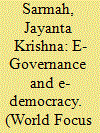

|
|
|
|
|
| Publication |
2013.
|
| Summary/Abstract |
E-governance is the use of Information Communication Technology (ICT) by Government, political institutions, civil society, Non-Governmental Organisations (NGOs) etc. to engage citizen through channels of communications and feedback process to promote greater participation in governance practice. E-governance is beyond the scope of e-government. While e-government is defined as a mere delivery of government services and information to the public using electronic means, e-governance allows direct participation of constituents in government activities.
|
|
|
|
|
|
|
|
|
|
|
|
|
|
|
|
| 2 |
ID:
090326
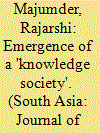

|
|
|
|
|
| Publication |
2009.
|
| Summary/Abstract |
In recent times knowledge has been recognised as a major source of efficiency, competitiveness, and economic growth and the resulting 'Knowledge Society' is supposed to be more egalitarian. Whether this happens depends on the level of penetration of the 'Knowledge Economy' (KE), its linkage with other sectors, the nature of the jobs created, and whether different stratum of society benefit from it equally. This paper uses the Indian experience to shed light on these issues. While huge potential for transition to a Knowledge Society exists in India, it would have to be preceded and accompanied by enabling policies such as investment in scientific research, standardisation of working conditions, and the building up of physical and social infrastructure.
|
|
|
|
|
|
|
|
|
|
|
|
|
|
|
|
| 3 |
ID:
018847
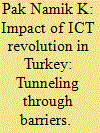

|
|
|
|
|
| Publication |
March-May 2001.
|
| Description |
5-20
|
|
|
|
|
|
|
|
|
|
|
|
|
|
|
|
| 4 |
ID:
128107
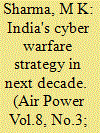

|
|
|
|
|
| Publication |
2013.
|
| Summary/Abstract |
The world is witnessing a remarkable shift in the locus of l=global power with the relative decline of the United States of America and the dramatic rise of China. It is estimated that the rise of India and China will alter the nature of the global system and the global landscape in the coming two decades. During this great geo-political transition period, there is an urgent need to revaluate our theories, paradigms, assumptions and strategies in the light of technological, economic, political and military developments in the region. The heavy dependence of government organizations, business, economic activities and military affairs of information and communication technology by (ICT) necessitates incorporation of cyber technology into our strategic calculation. Cyber power is exerting itself as a key lever in the development and execution of national policy, including counter-terrorism, economic growth, and diplomatic affairs.
|
|
|
|
|
|
|
|
|
|
|
|
|
|
|
|
| 5 |
ID:
094854
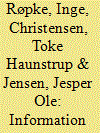

|
|
|
|
|
| Publication |
2010.
|
| Summary/Abstract |
Information and communication technologies (ICTs) increasingly permeate everyday life in industrialized societies. The aim of this paper is to explore ICT-related transformations of everyday practices and discuss the implications, particularly for residential electricity consumption. The present socio-technical changes are seen in a historical perspective, and it is argued that the integration of ICT into everyday practices can be seen as a new round of household electrification, comparable to earlier rounds that also led to higher electricity consumption. A case study carried out in Denmark in 2007-2008 explores the present changes in everyday life. Based on qualitative interviews, the study focuses on people's ways of integrating ICTs into their everyday practices, on any significant changes in these practices, and on the influence of the changed practices on electricity consumption. The paper concludes with a discussion on the implications for energy policy.
|
|
|
|
|
|
|
|
|
|
|
|
|
|
|
|
| 6 |
ID:
180686
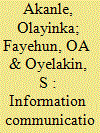

|
|
|
|
|
| Summary/Abstract |
Studies abound on international migration and remittances across the world and studies are particularly not lacking on the subject in Africa. There are however few studies on the moderating roles of information communication technology (ICT) and social media in the relationships among international migration, remittances and relationships in Sub-Saharan Africa. This article examines the dimension of ICT and social media in migration studies. This is an aspect that has often been ignored and overlooked even though ICT and social media have great contributions in the international migration process particularly as migrants and relatives in sending and receiving countries both have the primary experience. Research objectives include: reasons for emigration; information technology/social media used by migrants and their kin as they relate across spaces; and how ICT affects relationships of kin and international migrants. Secondary data were gathered through journals, books, documents and reliable Internet sources. Primary data were gathered in Ibadan, Nigeria in 2018 through 30 in-depth interviews analysed through content analysis. Findings reveal the nature of ICT used by international migrants and their kin and purpose of utilization and the effects of ICT on international migration, remittances and kinship networks. The article presents detailed data, narratives, interpretations and implications of relationships among international migration, ICT/social media and kinship networks. This article argues that ICT/social media is central to international migration decision-making, access of migrants and kin to social forces and factors motivating international migration, and it is very important to how migrants and kin maintain and/or weaken relationships and access to remittances and utilization.
|
|
|
|
|
|
|
|
|
|
|
|
|
|
|
|
| 7 |
ID:
106484
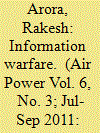

|
|
|
| 8 |
ID:
099424
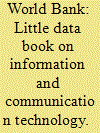

|
|
|
|
|
| Publication |
Washington, DC, World Bank, 2010.
|
| Description |
vi, 230p.
|
| Standard Number |
9780821382486
|
|
|
|
|
|
|
|
|
|
|
|
Copies: C:1/I:0,R:0,Q:0
Circulation
| Accession# | Call# | Current Location | Status | Policy | Location |
| 055323 | 303.4833/WOR 055323 | Main | On Shelf | General | |
|
|
|
|
| 9 |
ID:
109874
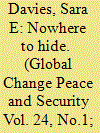

|
|
|
|
|
| Publication |
2012.
|
| Summary/Abstract |
Since the revisions to the International Health Regulations (IHR) in 2005, much attention has turned to how states, particularly developing states, will address core capacity requirements attached to the revised IHR. Primarily, how will states strengthen their capacity to identify and verify public health emergencies of international concern (PHEIC)? Another important but under-examined aspect of the revised IHR is the empowerment of the World Health Organization (WHO) to act upon non-governmental reports of disease outbreaks. The revised IHR potentially marks a new chapter in the powers of 'disease intelligence' and how the WHO may press states to verify an outbreak event. This article seeks to understand whether internet surveillance response programs (ISRPs) are effective in 'naming and shaming' states into reporting disease outbreaks.
|
|
|
|
|
|
|
|
|
|
|
|
|
|
|
|
| 10 |
ID:
132741
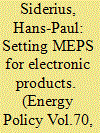

|
|
|
|
|
| Publication |
2014.
|
| Summary/Abstract |
When analysing price, performance and efficiency data for 15 consumer electronic and information and communication technology products, we found that in general price did not relate to the efficiency of the product. Prices of electronic products with comparable performance decreased over time. For products where the data allowed fitting the relationship, we found an exponential decrease in price with an average time constant of ?0.30 [1/year], meaning that every year the product became 26% cheaper on average.
The results imply that the classical approach of setting minimum efficiency performance standards (MEPS) by means of life cycle cost calculations cannot be applied to electronic products. Therefore, an alternative approach based on the improvement of efficiency over time and the variation in efficiency of products on the market, is presented. The concept of a policy action window can provide guidance for the decision on whether setting MEPS for a certain product is appropriate. If the (formal) procedure for setting MEPS takes longer than the policy action window, this means that the efficiency improvement will also be achieved without setting MEPS. We found short, i.e. less than three years, policy action windows for graphic cards, network attached storage products, network switches and televisions.
|
|
|
|
|
|
|
|
|
|
|
|
|
|
|
|
| 11 |
ID:
105697
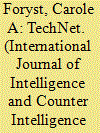

|
|
|
| 12 |
ID:
089239
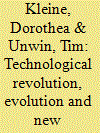

|
|
|
|
|
| Publication |
2009.
|
| Summary/Abstract |
This paper provides an overview of recent developments in the use of information and communication technologies for development, and argues that, while they do indeed offer new potential for resolving some of the classic dilemmas of development policy and practice, insufficient attention has yet been paid to the lessons that can be learnt from previous information and communication initiatives
|
|
|
|
|
|
|
|
|
|
|
|
|
|
|
|
| 13 |
ID:
069387
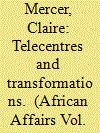

|
|
|
|
|
|
|
|